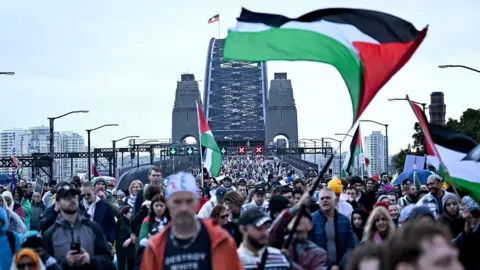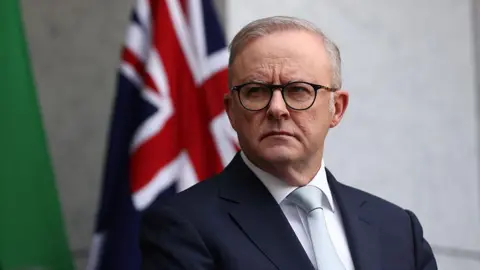Australia-Israel ties hit new low amid mass protests, but officials say business continues
Tens of thousands rallied across Australia after a diplomatic fallout that included visa cancellations and accusations of foreign interference, even as diplomats maintain day-to-day cooperation.
Australia and Israel have seen relations plunge to what officials and analysts describe as an unprecedented low, marked by cancelled visas, public recriminations and allegations of interference — yet diplomats say routine cooperation has largely continued behind the scenes.
Tens of thousands of people took to streets in capital cities across Australia on Aug. 24 to call for an end to violence in Gaza, to condemn the Israeli government’s actions and to press the Australian government for a stronger response. The protests followed a massive demonstration on Aug. 3, when a large march crossed the Sydney Harbour Bridge in one of the country’s biggest political gatherings in recent memory.

The public demonstrations have coincided with a sharp diplomatic deterioration. Australian officials have cancelled some visas and exchanges; political leaders on both sides have traded increasingly hostile rhetoric, and there have been claims and denials about Israeli involvement in Australia’s internal affairs following Canberra’s expulsion of Iran’s ambassador. Israeli Prime Minister Benjamin Netanyahu’s comments about Australia have been described in recent weeks as markedly bitter.
Despite the public acrimony, Australian and Israeli diplomats have continued to carry out many of the practical elements of bilateral relations, according to people familiar with the matter. Those day-to-day ties include defence and intelligence cooperation that governments often treat as separate from public political disputes.
The protests added fresh pressure on Australia’s government to recalibrate its public messaging and actions on the Middle East. Demonstrators in multiple cities urged Canberra to condemn civilian casualties and call for humanitarian pauses in Gaza, reflecting wider public concern that has intensified since the flare-up of fighting.
Australian authorities have sought to balance domestic political pressures with longstanding strategic and trade interests. Israel has been equally attentive to preserving security cooperation even as officials publicly denounce criticism from Australian politicians and sections of the Australian public.
Observers note the diplomatic row has been more visible than most previous disputes between the two countries because it was accompanied by large-scale street demonstrations and a spike in heated public commentary from senior officials. The combination has heightened media attention and fuelled claims on social media about behind-the-scenes manoeuvring.

Both governments face domestic constraints. Australian leaders must respond to a vocal electorate and extensive civil society campaigning, while Israeli leaders are contending with security concerns, internal politics and global scrutiny of military operations. That dynamic has made the relationship particularly sensitive, observers said.
Diplomats and analysts say that while public confrontation increases short-term tensions, long-standing areas of cooperation — especially in security, technology and trade — give both countries incentives to compartmentalise disputes and keep certain channels open. Officials on both sides have been cautious in public comments about long-term ruptures, framing recent actions as part of a broader, sometimes tense, alliance rather than an outright break.
The immediate future of Australia-Israel ties will likely be shaped by developments on the ground in the Middle East, domestic political pressures in Canberra and Jerusalem, and any further revelations about alleged interference or diplomatic intervention. For now, the unusual combination of high-profile street protests and an overt diplomatic spat has left relations visibly strained, even as the machinery of bilateral cooperation continues to operate in less visible ways.
